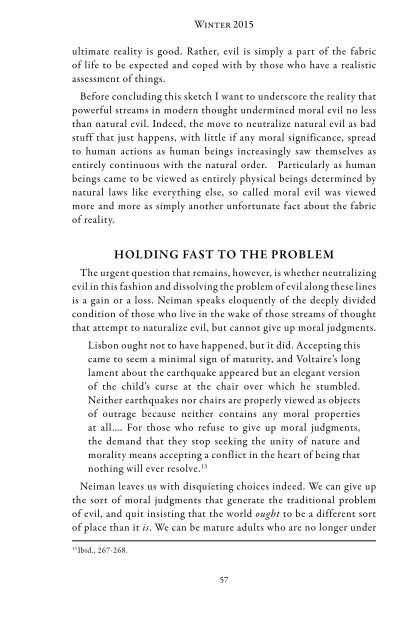THE CITY
h6c7p5d
h6c7p5d
You also want an ePaper? Increase the reach of your titles
YUMPU automatically turns print PDFs into web optimized ePapers that Google loves.
Winter 2015<br />
ultimate reality is good. Rather, evil is simply a part of the fabric<br />
of life to be expected and coped with by those who have a realistic<br />
assessment of things.<br />
Before concluding this sketch I want to underscore the reality that<br />
powerful streams in modern thought undermined moral evil no less<br />
than natural evil. Indeed, the move to neutralize natural evil as bad<br />
stuff that just happens, with little if any moral significance, spread<br />
to human actions as human beings increasingly saw themselves as<br />
entirely continuous with the natural order. Particularly as human<br />
beings came to be viewed as entirely physical beings determined by<br />
natural laws like everything else, so called moral evil was viewed<br />
more and more as simply another unfortunate fact about the fabric<br />
of reality.<br />
HOLDING FAST TO <strong>THE</strong> PROBLEM<br />
The urgent question that remains, however, is whether neutralizing<br />
evil in this fashion and dissolving the problem of evil along these lines<br />
is a gain or a loss. Neiman speaks eloquently of the deeply divided<br />
condition of those who live in the wake of those streams of thought<br />
that attempt to naturalize evil, but cannot give up moral judgments.<br />
Lisbon ought not to have happened, but it did. Accepting this<br />
came to seem a minimal sign of maturity, and Voltaire’s long<br />
lament about the earthquake appeared but an elegant version<br />
of the child’s curse at the chair over which he stumbled.<br />
Neither earthquakes nor chairs are properly viewed as objects<br />
of outrage because neither contains any moral properties<br />
at all…. For those who refuse to give up moral judgments,<br />
the demand that they stop seeking the unity of nature and<br />
morality means accepting a conflict in the heart of being that<br />
nothing will ever resolve. 13<br />
Neiman leaves us with disquieting choices indeed. We can give up<br />
the sort of moral judgments that generate the traditional problem<br />
of evil, and quit insisting that the world ought to be a different sort<br />
of place than it is. We can be mature adults who are no longer under<br />
13<br />
Ibid., 267-268.<br />
57


